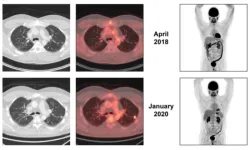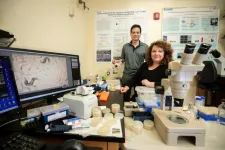(Press-News.org) A new study led by researchers at the University of Chicago found that changes in male gender expression from adolescence to young adulthood align closely with the gender norms present in individuals’ school environments, and that these trajectories are associated with subsequent patterns of substance abuse.
Amidst a growing consensus among social science researchers that separates gender from biological sex, gender has come to be defined as a constellation of expected behaviors, attributes, preferences and beliefs typically associated with a specific gender identity. Prior research shows that traditional models of male gender identity, constructed over time through sociocultural processes and interactions, can be a risk factor for unhealthy behaviors.
With that background, the UChicago researchers set out to explore how sociocultural pressures around male gender in particular might evolve in relation to environmental factors, and how that change could impact a person's long-term health in specific ways.
“There’s a real misconception that men aren’t particularly sensitive or emotional,” said Nathaniel Glasser, MD, a general internist and pediatrician at UChicago Medicine and lead author on the paper. “In reality, I think men’s emotions simply present differently because of the impact of sociocultural narratives telling them not to express emotions through tears or words that construe weakness. And they can face especially harsh social and psychological penalties if they fail to live up to the norms of their gender identity.”
“We set out to investigate how that often-overlooked sensitivity among cisgender men might manifest in a reluctance to engage in healthy behaviors, as well as an over-engagement in health risk behaviors in an effort to convey dominance and reduce vulnerability,” Glasser said.
Impact of gender dynamics within school environments
The UChicago researchers used data from a nationally representative longitudinal cohort study called Add Health. In the initial round of data collection in the 1990s, the study enrolled large numbers of participants who attended the same schools, which enabled granular social network mapping and analyses. Rather than being limited to analyzing data from individuals out of context, researchers could find out how each person compared to their peers in gender expression and who they identified as people close to them.
Using a previously validated technique, Glasser and his colleagues Jacob Jameson, Elizabeth Tung, Stacy Lindau and Harold Pollack measured male gender expression quantitatively by analyzing survey responses to survey items that were found to be answered most differently by male versus female respondents, such as frequency of crying and military service. Importantly, this empirically derived method helped them avoid projecting today’s gender norms onto adolescents in the 1990s.
The researchers found that the way adolescent boys at a school are enacting their gender has a significant impact on other males who attend that school, shaping the ways those same males respond to sociocultural pressures around male gender as young adults. That in turn predicts their likelihood of engaging in substance abuse.
Adolescent boys whose gender expression was further from their school’s norm showed the greatest change in their gender expression as young adults, shifting toward that local norm of their school. Those who displayed the greatest changes were also the most likely to abuse substances including alcohol, cigarettes, marijuana and recreational drugs as young adults.
“These results add quantitative evidence to a conclusion that others have already drawn qualitatively: local expectations shape people’s understanding of their identity and how they perform it to their peers,” said senior author Harold Pollack, PhD, the Helen Ross Distinguished Service Professor at the UChicago Crown Family School of Social Work, Policy and Practice.
Countering the narrative to promote health
Based on these results, Pollack suggested public health experts could play a role in countering detrimental cultural narratives, such as when advertisers use gender-based messaging to promote harmful products like tobacco, alcohol or gambling platforms.
“It’s important to understand what motivates people,” he said. “If someone has a male gender expression where they put a lot of weight on self-reliance and strength and being a source of strength for the people around them, we can help them see that one of the ways to do that is by attending to their health.”
This study is part of a larger body of research around the tangible health effects of social pressures, especially those related to gender identity and expression. The results have the potential to shape paradigms in public health research and in clinical practice.
“We need to start taking social pressures more seriously as health determinants,” Glasser said. “If someone thinks using a product or following a doctor’s recommendation will undermine their identity or status or cause some kind of embarrassment, it is worth considering that social barrier as seriously as affordability or transportation issues.”
The study, “Associations of Adolescent School Social Networks, Gender Norms, and Adolescent-to-Adult Changes in Male Gender Expression With Adult Substance Abuse,” was published in the Journal of Adolescent Health in January 2024. In addition to Pollack and Glasser, co-authors were Jacob Jameson of Harvard University and Elizabeth Tung and Stacy Lindau of University of Chicago.
END
Male gender expression in schools is associated with substance abuse later in life
2024-01-12
ELSE PRESS RELEASES FROM THIS DATE:
Goldstein selected to help lead statewide task force addressing heart disease and stroke
2024-01-12
LEXINGTON, Ky. (Jan. 12, 2024) — Larry Goldstein, M.D., chair of the University of Kentucky Department of Neurology, has been selected to serve as co-chair of The Kentucky Heart Disease and Stroke Prevention (KHDSP) Task Force representing stroke systems of care across the state.
Goldstein is co-director of the Kentucky Neuroscience Institute, co-director of the UK Neuroscience Research Priority Area, contact PI for the state’s CDC Coverdell National Acute Stroke Program grant, and interim director of the UK-Norton Healthcare Stroke Care Network. Additionally, he also sits on ...
Healthy Hearts for Women event marks 10 years of raising awareness
2024-01-12
LEXINGTON, Ky. (Jan. 12, 2024) — The University of Kentucky will mark a decade of raising awareness and continuing its effort to warn women about the dangers of heart disease with the annual Healthy Hearts for Women Symposium.
Cardiovascular disease is the No. 1 killer of women, causing 1 in 3 deaths each year, according to the American Heart Association. Yet, only 44% of women recognize that cardiovascular disease is their greatest health threat.
“We see the evidence of this devastating statistic right here in Kentucky. The Commonwealth has the highest rates of deaths due to cardiovascular disease in women ...
Building trust and saving lives: A community approach to genetic education
2024-01-12
Changes to DNA, known as mutations, can increase the likelihood of developing cancer. Specifically, people with mutations in their BRCA 1 and 2 genes are substantially more likely to develop hereditary breast and ovarian cancers. But how do people know if they have these mutations?
Genetic testing.
Genetic testing allows doctors to see these microscopic changes. Knowing these mutations exist, doctors will check for signs of breast and ovarian cancers more often.
Yet minorities, especially Black women, are less likely to participate in genetic testing. ...
Using idle trucks to power the grid with clean energy
2024-01-12
University of Waterloo researchers are tapping into idled electric vehicles to act as mobile generators and help power overworked and aging electricity grids.
After analyzing energy demand on Alberta’s power grid during rush hour, the research proposes an innovative way to replenish electrical grids with power generated from fuel cells in trucks.
“Canada’s power grids need to be upgraded,” said Dr. XiaoYu Wu, lead researcher and a professor in Waterloo’s Department of Mechanical and Mechatronics Engineering.
“But the price ...
Activity of pazopanib in EWSR1-NFATC2 translocation-associated bone sarcoma
2024-01-12
“Pazopanib is a multi-kinase inhibitor that is currently approved for treatment of advanced renal cell carcinoma and chemotherapy-refractory soft tissue sarcoma.”
BUFFALO, NY- January 12, 2024 – A new case report was published in Oncoscience (Volume 10) on September 20, 2023, entitled, “Activity of pazopanib in EWSR1-NFATC2 translocation-associated bone sarcoma.”
Pazopanib, a multi-kinase VEGF inhibitor, is currently FDA approved for advanced renal cell carcinoma and advanced soft tissue sarcoma; but limited evidence exists on its efficacy in bone sarcomas.
In this case report, researchers Mohamed A. Gouda, ...
3D in vitro human atherosclerosis model for high-throughput drug screening
2024-01-12
BIRMINGHAM, Ala. – A groundbreaking 3D, three-layer nanomatrix vascular sheet that possesses multiple features of atherosclerosis has been applied for developing a high-throughput functional assay of drug candidates to treat this disease, University of Alabama at Birmingham researchers report in the journal Biomaterials.
“Current in vitro atherosclerosis models have significant limitations, including the lack of three-layer vascular architecture and limited atherosclerotic features,” said Ho-Wook Jun, Ph.D., a professor ...
The early bird (or scientist) gets the worm
2024-01-12
RIVERSIDE, Calif. -- Size does not matter. Certainly not when it comes to tiny worms securing the attention of biologists. One such biologist, Morris F. Maduro at the University of California, Riverside, has just been awarded a grant of nearly $1.3 million from the National Science Foundation, or NSF, to study a worm (or nematode) about a millimeter in length.
The research project will focus on the gut of Pristionchus pacificus. Like most nematodes, P. pacificus develops quickly, its growth from embryo to adult taking just four days. It is a complete ...
News media trigger conflict for romantic couples with differing political views
2024-01-12
CHAMPAIGN, Ill. — By one estimate, as many as 30% of people in the U.S. are in romantic relationships with partners who do not share their political views. In today’s hyperpartisan climate, where Democrats and Republicans have difficulty talking to each other and their views are polarized about media outlets’ credibility, how do couples with differing political perspectives decide which media to follow? And how do these decisions affect their discussions on political issues and their relationship ...
Earth-sized planet discovered in ‘our solar backyard’
2024-01-12
MADISON — A team of astronomers have discovered a planet closer and younger than any other Earth-sized world yet identified. It’s a remarkably hot world whose proximity to our own planet and to a star like our sun mark it as a unique opportunity to study how planets evolve.
The new planet was described in a new study published this week by The Astronomical Journal. Melinda Soares-Furtado, a NASA Hubble Fellow at the University of Wisconsin–Madison who will begin work as an astronomy professor at the university in the fall, and recent UW–Madison graduate Benjamin Capistrant, now a graduate student at the University of Florida, co-led the study with co-authors from ...
NASA analysis confirms 2023 as warmest year on record
2024-01-12
Earth’s average surface temperature in 2023 was the warmest on record, according to an analysis by NASA. Global temperatures last year were around 2.1 degrees Fahrenheit (1.2 degrees Celsius) above the average for NASA’s baseline period (1951-1980), scientists from NASA’s Goddard Institute for Space Studies (GISS) in New York reported.
“NASA and NOAA’s global temperature report confirms what billions of people around the world experienced last year; we are facing a climate ...







